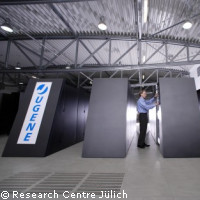New supercomputer JUGENE goes online
An official ceremony on 22 February marked the inauguration of the fastest civil supercomputer in the world at the moment. The computer, known as JUGENE, is situated at the Research Centre Jülich, Germany, which is coordinator of the newly launched EU project PRACE (Partnership for Advanced Computing in Europe). JUGENE performs around 167 trillion mathematical calculations per second (167 teraflops) and is Europe's fastest supercomputer. It is a model from IBM's new Blue Gene/P series, containing more than 65,000 processors. In the current global ranking list, the TOP500, it holds second place behind Blue Gene/L in the USA. From now on, JUGENE will be available to researchers and provide processing power for simulations and for solving other complex problems. 'Supercomputer users benefit from dedicated subject-specific support in Jülich,' Thomas Lippert, director of the Jülich Supercomputing Centre, explained. 'External groups can make use of our knowhow through cooperations and can therefore conduct their calculations and research in a highly efficient manner.' 'Science and industry need computing power of the highest quality - on the one hand, to conduct pioneering research, and on the other, to create innovations,' said Professor Achim Bachem, chairman of the board of directors at the Research Centre Jülich. 'With JUGENE, we have now set another milestone in Jülich for cutting-edge research. We will map out the next few stages together with our partners in the German Gauss Centre for Supercomputing and create long-term competitive supercomputing infrastructures in Europe.' The Gauss Centre is made up of three high-performance computing centres in Jülich, Munich and Stuttgart. It was founded in April 2007 on the initiative of the German Ministry for Education and Research (BMBF). 'The Gauss Centre assumes a leading role in establishing the European super computing centre,' commented Thomas Rachel, Parliamentary Secretary of State at the BMBF. 'This computer further strengthens our position within Europe.' 'The commitment shown by the Research Centre Jülich in the field of supercomputing has proven to be beneficial in many ways,' commented Martin Jetter, CEO of IBM Germany. 'The public authorities have set a precedent for Germany as a location for research and development. 'Our complementary perspectives in supercomputing allow us to work together towards realising the goal of developing the most powerful effective compact computers,' Mr Jetter added. JUGENE is not the only supercomputer to be found in Jülich. Two additional machines, called JUMP and JUBL, complement the new supercomputer. Together, they provide processing power to around 200 European research groups from materials science and particle physics to medicine and environmental science. Jülich also takes up the leading role in the EU-funded PRACE project, dedicated to creating a permanent European supercomputing infrastructure. By mid-2009 or the end of that year at the latest, the project partners from Austria, Finland, France, Germany, Greece, Italy, the Netherlands, Norway, Poland, Portugal, Spain, Sweden, Switzerland and the UK hope to be able to build a petaflop/s system: a machine that is capable of one quadrillion operations per second.
Countries
Germany



